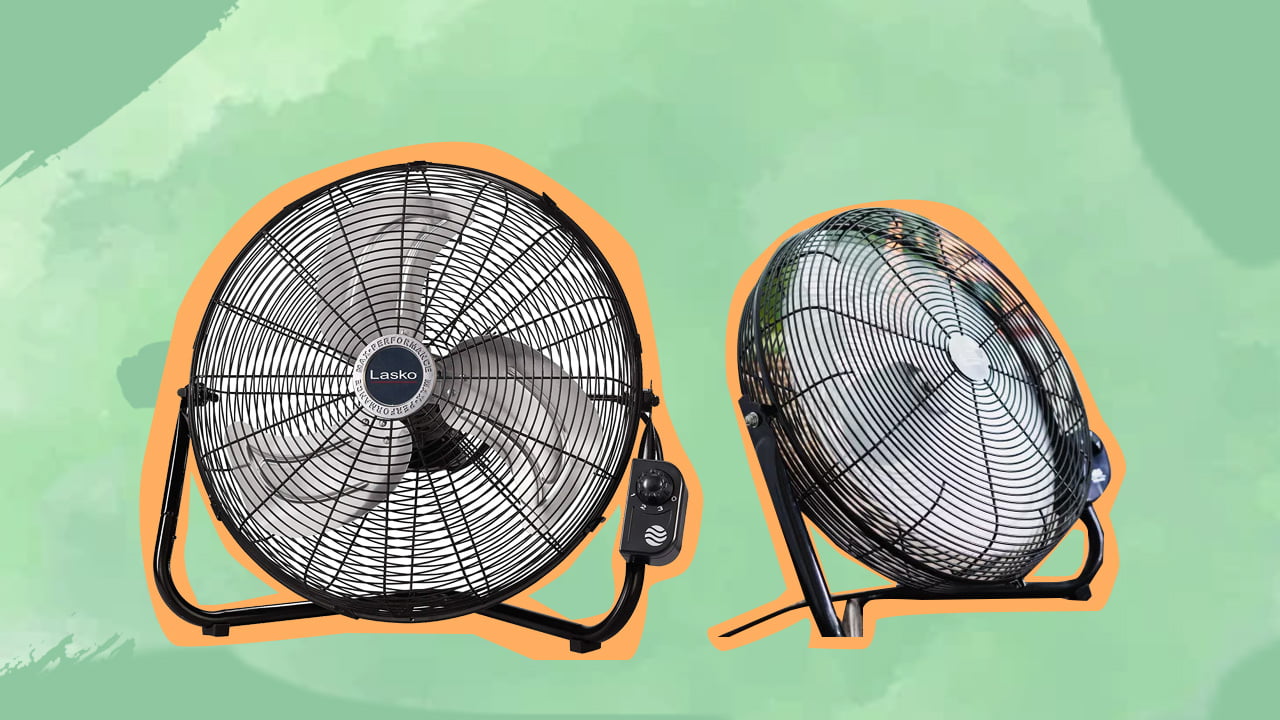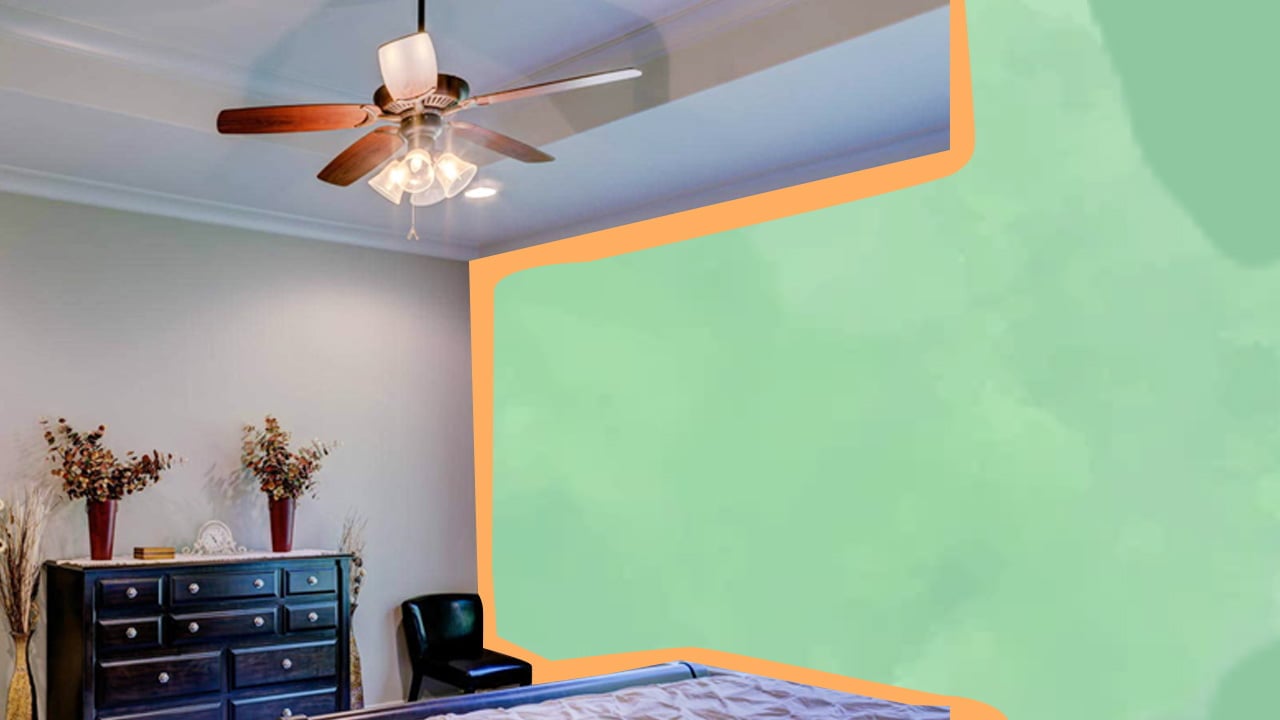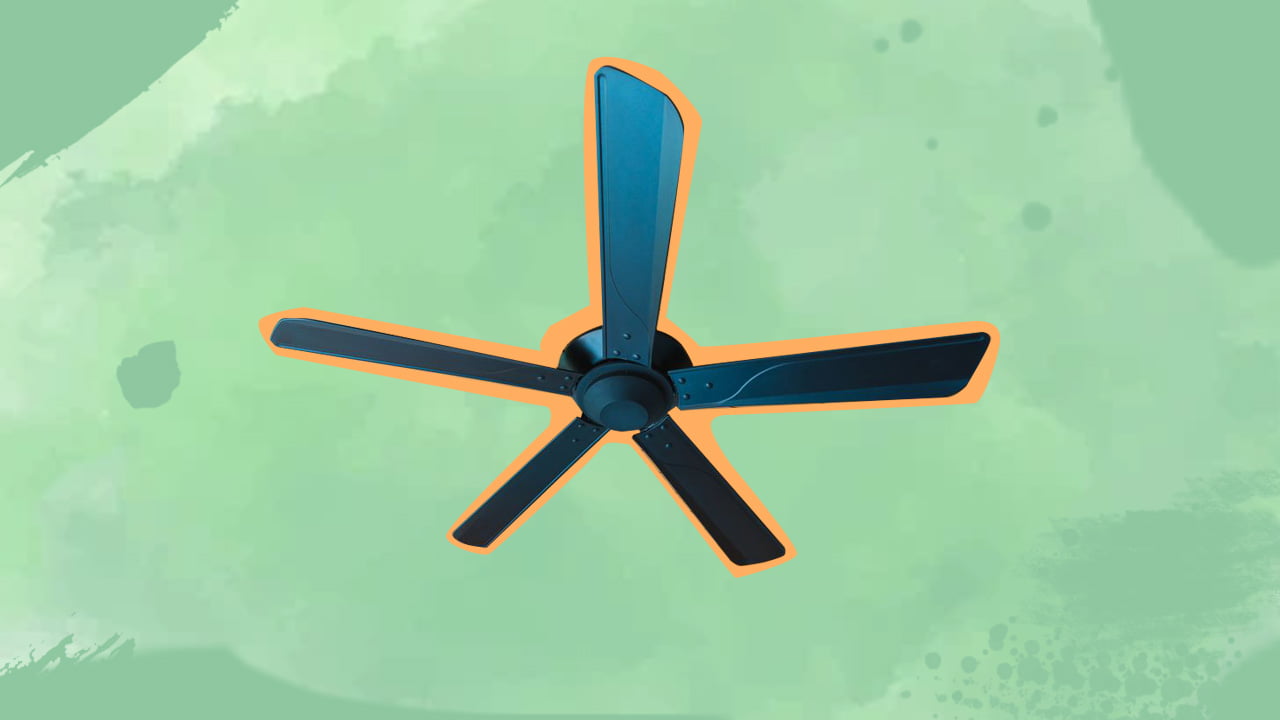Drawing blackout curtains throughout the day is one of the most popular ways to block heat from entering a space. Even placing box fans strategically, rotating your ceiling fan counterclockwise, and opening the door and windows are other options.

We’ve all been there: it’s 2 in the morning, and you’re tossing, turning, and unable to sleep because you’re soaked in sweat. Surviving the hot weather or climate becomes a real challenge if your bedroom doesn’t have proper ventilation.
Air conditioners are a clear-cut solution to this problem, but with them comes high utility bills. So, what does a budget-conscious individual do? I’ve got you covered with some tried-and-tested hacks to cool a room.
18 Tips On How To Cool Down A Room Without AC

1. Curtains
One of the easiest ways to cool a room during summer is to draw curtains during the day and block the sun’s rays from entering your space. Leaving the curtains open will allow hot air to enter the room, but if the curtains are drawn until the sun sets, warm air will be replaced with cool air.
For windows that receive a lot of direct sunlight, using window blinds or dark-colored, blackout curtains will be the best bet. One of the reasons I suggest them over regular curtains is because of their thermal insulation properties but also sound insulation properties.
You can also go for an exterior window shutter, awnings, or towel that prevents the sun’s rays from reaching your windows.
2. Place Your Box Fans Strategically
Fans, an energy-efficient alternative to AC units, are powerful appliances that circulate cool air in small and large spaces. In the absence of an AC, a box fan will come to your rescue, but you can not simply pull them out and switch them on.
To circulate the cold air in a space, place your box fan on a window such that it faces out of the window. This way, it will push hot air outdoors, making your room cool.
Since ACs cost $29 billion each year as stated by the United States Department of Energy (DOE), fans are suitable for cooling a space.
3. Adjust Your Ceiling Fan For Better Air Circulation
Don’t have a box fan? Perhaps, a ceiling fan will make your home cool on hot days. Although ceiling fans won’t lower the temperature of your space like AC units or window fans, they are still ideal for circulating cool air.
The blades of the ceiling fan produce a slightly cool breeze, which drains sweat from the skin, thereby cooling you down.
Here’s how you should use the ceiling fan to make the most out of it:
I. Turn Off Your Fan Before Leaving The Room
One mistake people often make is to leave the ceiling fan on when they aren’t in a room. However, running a ceiling fan in an empty room won’t make your space cooler as an AC would. Rather, it’s a waste of energy– you will only jack up your electric bill because ceiling fans only keep you cool, not the room.
II. Rotate It Counterclockwise
Not many know that ceiling fans come with two settings– you can either force the warm air downwards or create a breeze. During the summer months, make sure that the fan blades rotate counterclockwise. This way, air will be pushed downwards, producing the wind chill effect.
III. Run Your Air Conditioning Unit With A Ceiling Fan
Combining an air conditioner with a ceiling fan can make your room cooler and help you stay cool without mounting up electricity bills. Set your air conditioner 4 degrees higher and turn on the ceiling fan to help the body cool.
Another reason I prefer running my AC along with the ceiling fan is that it works as a dehumidifier, reducing the humidity of a room.
4. Refrain From Using Heat-Emitting Appliances
A few electronics or home appliances like clothes dryers, washing machines, stoves, ovens, and dishwashers produce a lot of heat when in use. Therefore, I suggest avoiding using them during the hottest part of the day, like afternoons.
Still, if you have to use them to complete your daily chores, close the room to prevent heat from spreading across your home. Also, try cooking or grilling your food by shutting the kitchen door.
Even computers emit a lot of heat, so switch them off whenever they aren’t in use. Also, if you use laptops, never keep them on your lap, as they raise the body temperature, making you feel hotter than it is.
An incandescent light bulb is another source of heat and one of the culprits behind heating a room. Keep these bulbs turned off as much as possible and allow cool air to invade the space.
Switching to electric light or LED light bulbs (light-emitting diodes) can make a world of difference to the overall temperature of your space. Energy-efficient bulbs like compact fluorescent lamps or LED lamps don’t generate as much heat as incandescent light bulbs, so they are environment-friendly, and worth the upgrade.
5. Open Windows And Doors At Night
Create a cross-breeze in the evening by opening the windows and doors of your room because by doing so, your space will be filled with cool air (night air). However, make sure to shut them before the sun rises, or hot air will enter the space.
6. Use Exhaust Fans To Dehumidify Your Space
Another thing I learned while searching for ways how to cool down a room without AC is using an exhaust fan to dry your space by sucking out warm and humid air. Installing them in your bathroom and kitchen will be the best bet to prevent warm air from traveling to the rest of your home. And you won’t need to waste money on buying a dehumidifier.
7. Install Window Fans On Open Windows
Have an open window? Install a window fan to cool down a room during a hot summer day. Window fans push out hot air and suck in cold air, thereby reducing the temperature of a room. Here I have mentioned a few practical ways to use window fans to cool your space:
I. Turn On A Window Fan When It Is Cold Outside
A window fan will only cool down a room when the outside temperature is lower than the inside temperature. Either you will have to do it early in the morning or late evening because these are the only times when the indoor temperature is higher than the outdoors.
Therefore, turning on the window fan at night or morning will bring in outdoor air and expel indoor air outside. A fitted sheet metal with open slots is used to mount these fans on the window, which seals around the corners. Therefore, closing and opening the window won’t be a problem.
Even after installing window fans, you must make sure the other parts of your home are closed during the daytime so that hot air cannot enter the space.
II. Create A Cross-Breeze Using More Than One Fan
To enhance the functionality of window fans, it’s best to use more than one in a space only then will it be possible to create a cross-breeze. However, it isn’t easy to do so, as placement matters a lot.
Here’s how you should place window fans strategically to cool down a room:
- Place one or more fans on the coolest part of your space, i.e., the north side
- Place the same number of fans on the opposite side, facing outward
- Keep all the doors open to maximize or create airflow.
Tip
One thing to keep in mind is that the number of fans installed on windows should ideally be the same. Individuals with an odd number of fans at home must remember to install more fans for pulling in cold air than for pushing warmer air out.
III. Synergize With Your Home Design
Working with your home design is important when it comes to cooling any space without an AC.
For instance, if you live in a multi-story building, position outward-blowing fans on the floor where it’s warmer, like the upper floors. Meanwhile, you will have to place inward-blowing fans on the ground or lower floors. This way, it is easy to get rid of warm air rising to the top stories of your home.
8. Take A Cold Shower
On a hot day, nothing can beat the heat like a cold shower– so you might as do that to dissipate body heat. However, never should you shower with cold water after coming from a hot environment or a space with a higher temperature.
If you do so, you run the risk of suffering from a heart attack. So, it’s always a good idea to cool off your body temperature by sitting under a fan for some time and then heading over to the washroom for a shower.
Taking a shower with cold water will lower the core temperature of your body, keeping you cool throughout the day.
9. Place Ice Cubes In Front Of the Tower Fans
If your AC still isn’t installed and the sweltering heat is making your life difficult, place ice cubes in front of a tower fan. This is one of my tried-and-tested hacks to cool down a room that I learned a few years back.
With this trick, you can create a do-it-yourself (DIY) air conditioner that will keep your room temperature down without racking up your utility bills.
When a container or bucket full of ice is placed in front of a fan, it doesn’t only circulate air throughout the space; rather, it produces a misty breeze. Make sure to keep a plate underneath the bowl to prevent water droplets from falling on the floor or the carpet.
Another thing I will suggest is to freeze 2 to 3 water bottles and keep them in front of the fan to cool down a room. So, when the ice cubes or ice packs melt, you can enjoy a cool breeze without turning on the air conditioning unit or a cooler.
10. Hang A Wet Sheet In Front Of The Window
Hanging a wet sheet in front of the window will cool down a room instantly, especially late evening or at night. What makes it one of the most effective cooling solutions is that moisture from the cotton sheets cools the breeze that enters the space from the window.
Or you can hang a curtain and spray it with cold water to cool your space on hot evenings.
11. Add Exterior Shade
If any of your downstairs rooms receive plenty of direct sunlight, creating an exterior shade will prove helpful, especially outside rooms where you catch your forty winks in the afternoon.
Consider positioning a gazebo or outdoor parasol close to the windows to provide shade from the sun. This way, your room will be less hot and humid, and more comfortable in the afternoon.
Along with that, make sure to add window treatments like blinds and curtains, which will further reduce sun exposure. Even shade trees are a great way to prevent the sun’s rays from invading a space. Another benefit is that you can open the window whenever you want and let in some fresh air.
12. Make Use Of Your Pulse Points
A simple way to disperse body heat is to apply a cooling solution to your pulse points. Feet, behind the knee, groin, ankle, elbow, neck, and wrist are your body parts where your pulse points are located.
Take a damp cloth (preferably old clothing) or an ice pack and apply it to any of those areas to reduce your body temperature, so you don’t feel hot.
13. Sleep On The Floor
Most mattresses, especially if they are old, aren’t breathable, which makes it difficult for people to sleep well or get rest at night. Even if you manage to sleep peacefully, you’re most likely to wake up soaked in sweat or perspiration.
So, in summer, the best way to sleep undisturbed is to sleep on the floor. Sleeping on the floor is more comfortable than on the mattress because the floor is cold and dissipates your body heat quickly.
14. Use Whole-House Fans
For all those wondering how to cool down a room without AC, here’s the answer: install whole-house fans in your space. The vent is located in a corridor and when you turn a knob on this vent, the duct opens, and the fan starts moving. Later, it absorbs heat or pulls hot air out from the space, cooling your room.
15. Freeze A Hot Water Bottle Or Bag
Another simple hack to beat the extreme heat is to place a frozen hot water bag or bottle on the bed where your feet lie. Since hot water bags are a mixture of a plastic composite material with rubber, they won’t leave water stains on the sheet by sweating. Moreover, it will stay cold for a long period of time.
16. Add Some Plants To Your Room
The latest trend in interior design is to introduce plants to your living space. But another benefit of adding plants to your space is they help cool down a room without an AC.
Green plants absorb heat or warm air and circulate cool air throughout the space, making it cozy and comfortable. A few worthy additions to your space are Chinese evergreens, rubber plants, snake plants, and weeping figs.
However, make sure to consult an indoor plant specialist to learn which plants will be a safe addition to your space, especially if you have children and pets at home.
17. Keep In Mind ‘Less And Loose’ When Going To Sleep
Drifting off to sleep on hot summer nights without an air conditioning system running in your room is difficult. That’s when you should remember two words: less and loose.
What I mean by that is you should wear loose cotton pajamas when going to sleep because they are super breathable, and you will remain comfortable throughout the night. If you want, you can wear shorts rather than pants and pair them with a tank top.
18. Sleep In The Basement Of Your Home
When your air conditioner is on the fritz and the temperature outdoors is high, sleeping in the basement will allow you to sleep peacefully. Wondering why? Remember heat rises from the lowest to the highest levels, so the topmost floors of a building are hotter than the lower floors.
If you sleep in the basement of your home, you will probably stay cooler throughout the night.

Takeaway: Cooling Down A Room Without AC
Cooling down a room during a heat wave or sweltering summer months is a difficult task, but not an impossible one. With so many tricks at your disposal, now you need not brainstorm ideas on how to cool down a room without AC.
Of all the solutions, covering windows with thick blackout curtains will block the sun’s rays to a great extent. Even fans, especially tower fans, are more efficient in producing cooler air than other solutions.
And on summer evenings, you can open the windows and doors to allow fresh air to enter the space. Just remember to shut your windows early in the morning because your home will start warming when the sun rises.
Related Articles
